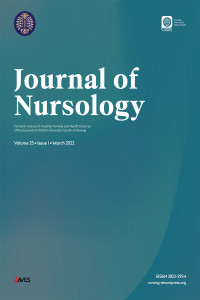OBSTETRİK ÖZELLİKLERİN GEBELİKTE DİSTRES ÜZERİNE ETKİSİ
anksiyete; gebelik; distress; obstetrik; hemşirelik
___
- Aasheim V, Waldenström U, Hjelmstedt A, Rasmussen S, Pettersson H, Schytt E. Associations Between Advanced Maternal Age and Psychological Distress in Primiparous Women, From Early Pregnancy to 18 Months Postpartum. BJOG: An International Journal of Obstetrics and Gynaecology. 2012;119(9):1108–1116.
- Altınçelep F. Gebelerdeki̇ Prenatal Di̇stres Düzeyi̇nin Beli̇rlenmesi̇. Yüksek Lisans Tezi, Sağlık Bilimleri Enstitüsü, İstanbul Bilim Üniversitesi.2011.p:96.
- Arslan B, Arslan A, Kara S, Öngel K, Mungan M. Gebelik Anksiyete ve Depresyonunda Risk Faktörleri: 452 Olguda Değerlendirme. Tepecik Eğitim Hastanesi Dergisi.2011;21(2):79–84.
- Barton K, Redshaw M, Quigley MA, Carson C. Unplanned Pregnancy and Subsequent Psychological Distress in Partnered Women: A Cross-Sectional Study of The Role of Relationship Quality and Wider Social Support. BMC Pregnancy and Childbirth. 2017;17(1):1–9.
- Bayrampour H, McDonald S, Tough S. Risk Factors of Transient and Persistent Anxiety During Pregnancy. Midwifery. 2015;31(6):582–589.
- Büyükkayacı Duman N. Socio-Demographic and Obstetric Factors Associated With Depression During Pregnancy in Turkey. American International Journal of Contemporary Research.2012;2(11):17–26.
- Clarke K, Saville N, Bhandari B, Giri K, Ghising M, Jha M, et al. Understanding Psychological Distress Among Mothers in Rural Nepal: A Qualitative Grounded Theory Exploration. BMC Psychiatry.2014;14(1):1–13.
- Çakır L, Can H. Gebelikte Sosyodemografik Değişkenlerin Anksiyete ve Depresyon Düzeyleriyle İlişkisi. The Journal of Turkish Family Physician.2012;3(2):35–42.
- Çapık A, Ejder Apay S, Sakar T. Gebelerde Distres Düzeyinin Belirlenmesi. Anadolu Hemşirelik ve Sağlık Bilimleri Dergisi.2015;18(3):196–203.
- Çapık A, Pasinlioğlu T. Validity and Reliability Study of The Tilburg Pregnancy Distress Scale into Turkish. Journal of Psychiatric and Mental Health Nursing.2015;22(4):260–269.
- Dağlar G, Nur N. Gebelerin Stresle Başa Çıkma Tarzlarının Anksiyete ve Depresyon Düzeyi İle İlişkisi. Cumhuriyet Tıp Dergisi.2014;36(4):429–441.
- Dilmen U. Gebelik ve Doğum. 2. Baskı. Ankara: Medya Bilişim Teknolojileri Yayıncılık.2013.p. 65-69
- Gariepy AM, Lundsberg LS, Miller D, Stanwood NL, Yonkers KA. Are Pregnancy Planning and Pregnancy Timing Associated With Maternal Psychiatric İllness, Psychological Distress and Support During Pregnancy? Journal of Affective Disorders.2016; 205:87–94.
- Gelenbe Öztürk EA. Gebelikte Depresyon Belirtilerinin Ortaya Çıkmasında Psikososyal Faktörlerin ve Kişilerin Psikolojik Dayanıklılığının Etkileri. Yüksek Lisans Tezi, Sağlık Bilimleri Enstitüsü,Beykent Üniversitesi.2017.p.119.
- Hacettepe Üniversitesi Nüfus Etütleri Enstitüsü.2013 Türkiye Nüfus ve Sağlık Araştırması. Hacettepe Üniversitesi Nüfus Etütleri Enstitüsü, T.C. Kalkınma Bakanlığı ve TÜBİTAK, Ankara, 2014.
- Ingstrup KG, Schou Andersen C, Ajslev TA, Pedersen P, Sørensen TIA, Nohr EA. Maternal Distress During Pregnancy and Offspring Childhood Overweight. Journal of Obesity. 2012. https://doi.org/10.1155/2012/462845
- Kızılkaya Beji N, Aydın Özkan S. Gebelikte Görülen Fizyolojik/Psikolojik Değişiklikler. Kızılkaya Beji, editör, Kadın Sağlığı ve Hastalıkları Hemşireliğine Giriş.1.Baskı. İstanbul: Nobel Tıp Kitabevi. 2015.p:228-244
- Lee A, Lam SK, Sze Mun Lau SM, Shi Yin Chong C, Chui HW, Tak Fong DY.. Prevalence, Course and Risk Factors For Antenatal Anxiety and Depression. Obstet Gynecol.2007;110(5):1102–12.
- Lukasse M, Helbig A, Benth J, Eberhard-Gran M. Antenatal Maternal Emotional Distress and Duration of Pregnancy. PLoS ONE.2014;9(7).e101682 https://doi.org/10.1371/journal.pone.0101682
- Mccarthy FP, Moss-morris R, Khashan AS, North RA, Baker PN, Dekker G, et al. Previous Pregnancy Loss Has an Adverse İmpact on Distress and Behaviour in Subsequent Pregnancy. BJOG: An International Journal of Obstetrics & Gynaecology.2015;122(13):1757–1764.
- Nasreen HE, Kabir ZN, Forsell Y, Edhborg M. Prevalence And Associated Factors of Depressive and Anxiety Symptoms During Pregnancy: A Population Based Study in Rural Bangladesh. BMC Women’s Health.2011;11(1):22.
- Pop VJM, Pommer AM, Pop-Purceleanu M, Wijnen HAA, Bergink, V, Pouwer F. Development of the Tilburg Pregnancy Distress Scale: The TPDS. BMC Pregnancy and Childbirth.2011;11(1):80.
- Prost A, Lakshminarayana R, Nair N, Tripathy P, Copas A, Mahapatra R, Costello A. Predictors of Maternal Psychological Distress in Rural India: A Cross-Sectional Community-Based Study. Journal of Affective Disorders.2012;138(3):277–286.
- Røsand GM, Slinning K, Eberhard-Gran M, Røysamb E,Tambs K. Artner Relationship Satisfaction and Maternal Emotional Distress in Early Pregnancy. Clinical Drug Investigation. 2011;11(161):157–179.
- Rubertsson C, Hellström J, Cross M, Sydsjö G. Anxiety in Early Pregnancy: Prevalence and Contributing Factors. Archives of Women’s Mental Health.2014;17(3): 221–228.
- Şahin P. Gebelikte Depresyon ve Anksiyete Belirti Düzeyi ve İlişkili Faktörler. Yüksek Lisans Tezi, Sağlık Bilimleri Enstitüsü, Mersin Üniversitesi. 2015.p:88.Tekgöz İ, Sunay D, Çaylan A, Kısa C. Gebeliğin Son 3 Ayında Anksiyete Bozukluğu ve İlişlkili Faktörlerin Değerlendirilmesi. Türkiye Aile Hekimliği Dergisi.2009;13(3): 132–136.
- Yeşilçiçek Çalık K, Aktaş S. Gebelikte Depresyon: Sıklık, Risk Faktörleri ve Tedavisi. Psikiyatride Güncel Yaklaşımlar.2011;3(1):142–162.
- Başlangıç: 1998
- Yayıncı: Atatürk Üniversitesi
ANNELERİN SÜNNET HAKKINDAKİ BİLGİ DURUMLARININ BELİRLENMESİ
Hava ÖZKAN, Hediye KARAKOÇ, Turgut YAPANOĞLU, Sultan Esra TEDİK
HEMŞİRELİK MESLEĞİNİN GAZETELERE YANSIMASI: ON BEŞ YILLIK DEĞİŞİM
Evrim EYİKARA, Gülcan EYÜBOĞLU, Zehra GÖÇMEN BAYKARA
EBELİK ÖĞRENCİLERİNDE MENSTRUASYON DÖNEMİNE YÖNELİK SEMPTOMLARIN DEĞERLENDİRİLMESİ
Tuğçe SAKAR, Ayla ÇAPIK, Merve AKKAŞ
RİSKLİ BİR GRUP OLAN KADINLARDA OSTEOPOROZ BİLGİ DÜZEYLERİ VE ETKİLEYEN ETMENLERİN BELİRLENMESİ
Neslihan ÖNER, Tuba TEKİN, Nurefşan KONYALIGİL
YAŞAMA SAĞLIKLI BAŞLAMANIN BASAMAKLARI
Elif ERBAY, Sümeyra TOPAL, Sevin ALTINKAYNAK
İNTRADİYALİTİK HİPOTANSİYON VE ÖNLEMEYE YÖNELİK HEMŞİRELİK YAKLAŞIMLARI
OBSTETRİK ÖZELLİKLERİN GEBELİKTE DİSTRES ÜZERİNE ETKİSİ
Tuğba DÜNDAR, Sevgi ÖZSOY, Hilmiye AKSU, Belma TOPTAŞ
HASTANEDE YATAN HASTALARIN AKILCI İLAÇ KULLANIMINA YÖNELİK BİLGİ VE DAVRANIŞLARININ İNCELENMESİ
